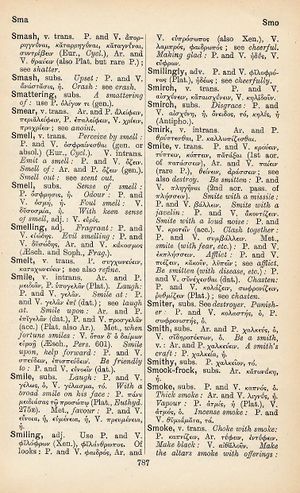smile: Difference between revisions
νόησε δὲ δῖος Ὀδυσσεὺς σαίνοντάς τε κύνας, περί τε κτύπος ἦλθε ποδοῖιν → godly Odysseus heard the fawning of dogs, and on top of that came the beat of two feet
m (Text replacement - "<b class="b2">Euthyd.</b>" to "''Euthyd.''") |
(D_8) |
||
| Line 23: | Line 23: | ||
Met., <b class="b2">favour</b>: P. and V. [[εὔνοια]], ἡ, [[εὐμένεια]], ἡ, V. [[πρευμένεια]], ἡ. | Met., <b class="b2">favour</b>: P. and V. [[εὔνοια]], ἡ, [[εὐμένεια]], ἡ, V. [[πρευμένεια]], ἡ. | ||
}} | |||
{{Gaffiot | |||
|gf=<b>smīlē</b>, f., v. [[smila]]. | |||
}} | }} | ||
Revision as of 06:50, 14 August 2017
English > Greek (Woodhouse)
v. intrans.
Ar. and P. μειδιᾶν, P. ὑπογελᾶν (Plat.).
Laugh: P. and V. γελᾶν.
Smile at: P. and V. γελᾶν ἐπί (dat.); see laugh at.
Smile upon: Ar. and P. ἐπιγελᾶν (dat.), P. and V. προσγελᾶν (acc.) (Plat. also Ar.).
Met., when fortune smiles: V. ὅταν δʼ ὁ δαίμων εὐροῇ (Aesch., Pers. 601).
Smile upon, help forward: P. and V. σπεύδειν, ἐπισπεύδειν.
Be friendly to: P. and V. εὐνοεῖν (dat.).
subs.
Laugh: P. and V. γέλως, ὁ, V. γέλασμα, τό.
With a broad smile on his face: P. πάνυ μειδιάσας τῷ προσώπῳ (Plat., Euthyd. 275E).
Met., favour: P. and V. εὔνοια, ἡ, εὐμένεια, ἡ, V. πρευμένεια, ἡ.
Latin > French (Gaffiot 2016)
smīlē, f., v. smila.

